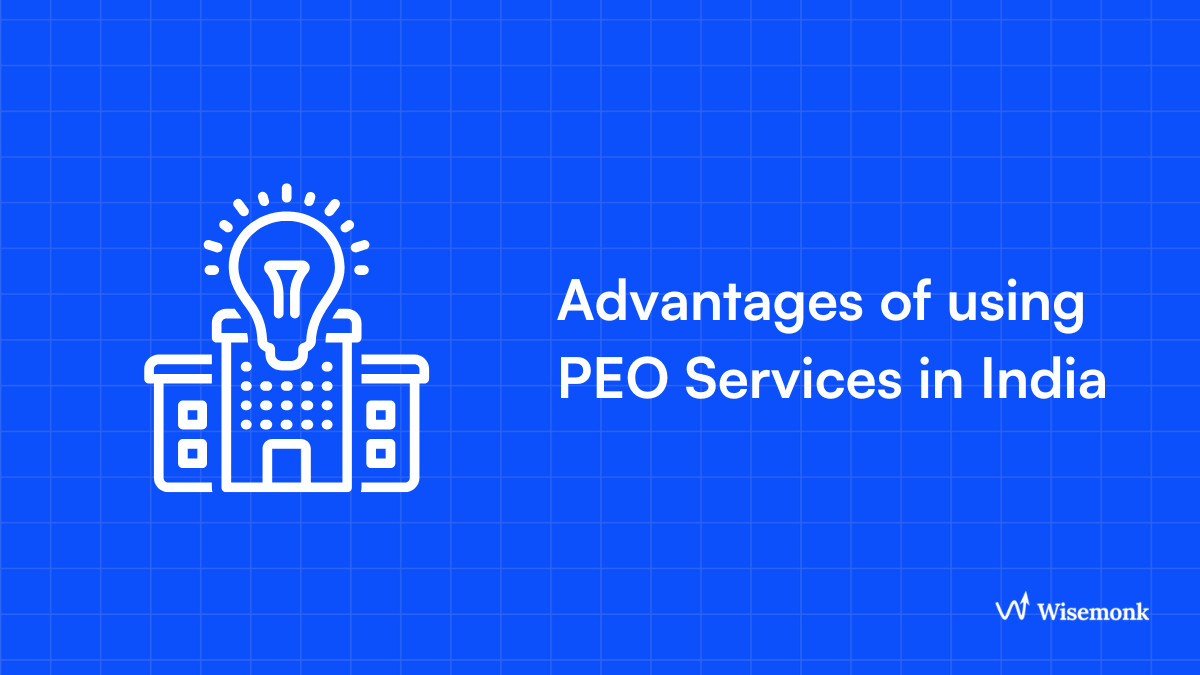Looking to simplify hiring in the Philippines without setting up a local entity? Navigating labor laws and payroll management can seem daunting for global companies aiming to hire Filipino employees. An Employer of Record Philippines (EOR) helps you hire employees while handling compliance, payroll processing, and employee benefits, making workforce management seamless. With a reliable EOR service provider, you can focus on your business needs and strategic growth while leaving all the hassle of statutory benefits, payroll taxes, and legal requirements in expert hands. In our experience, we have seen that EOR solutions are a game-changer for companies seeking to expand into this vibrant market, ensuring full compliance with local employment laws and offering cost savings compared to traditional entity setup.
What are the key Philippine employment regulations every employer must know?[toc=Employment Law Framework]
Hiring in the Philippines means closely following local labor laws and benefits. Here’s what every employer of record must keep in mind:
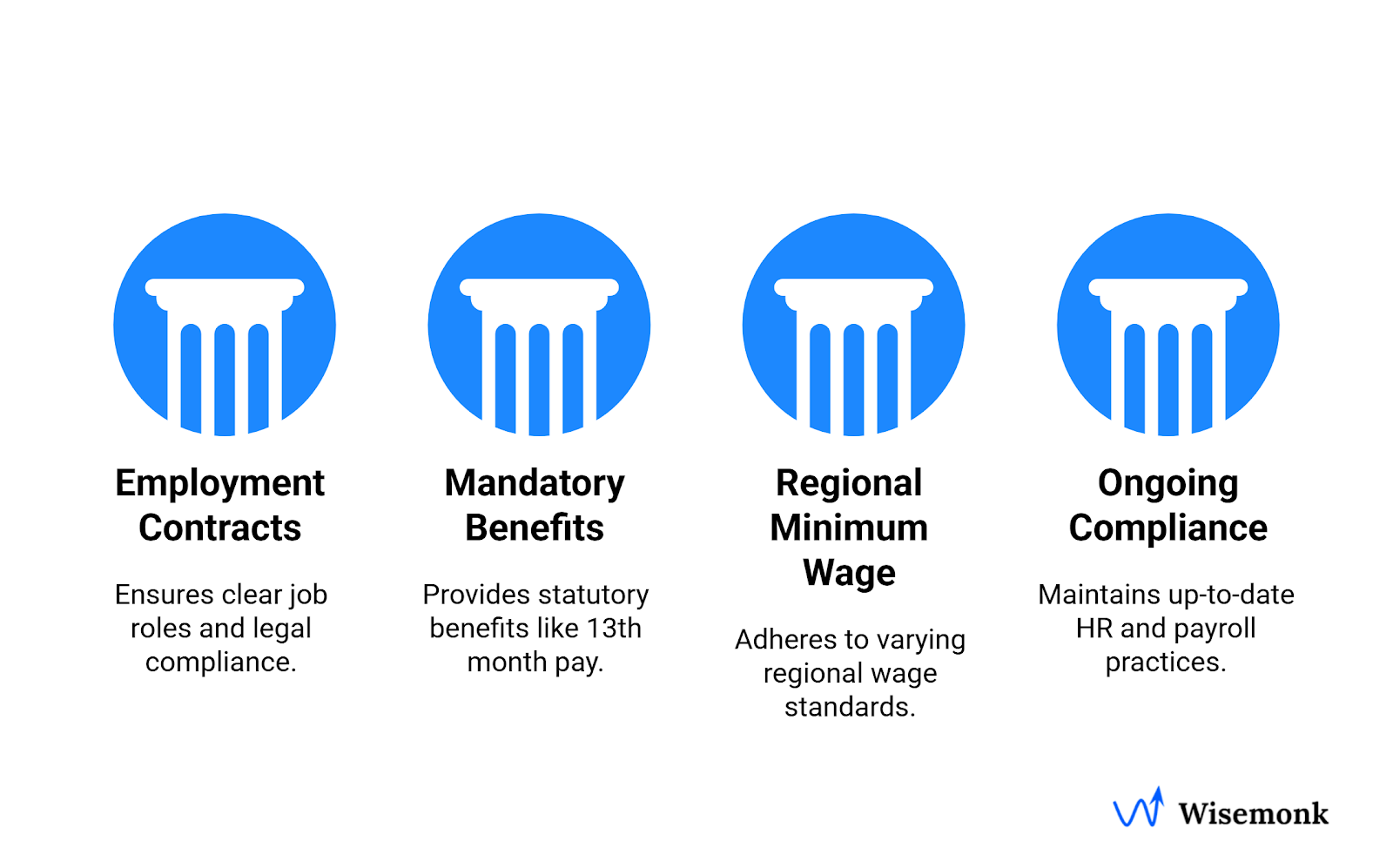
Employment Contracts and Probation
Every employment relationship must begin with a compliant contract. Employment contracts should clearly define job roles, compensation, employee benefits, probation rules (not exceeding 6 months), local labor laws, and all termination procedures. Having proper contracts is the best way to reduce legal risks and ensure compliant employment contracts for both Filipino and remote employees.
Mandatory Benefits for Filipino Employees
The Labor Code of the Philippines requires all employers to provide specific statutory benefits:
- 13th-month pay, or one-twelfth (1/12) of annual basic salary, must be paid to all rank-and-file employees by December 24 each year, even for those not working a full year.
- SSS, PhilHealth, and Pag-IBIG contributions are mandatory, with employer and employee shares. Recent updates have increased some of these monthly remittance rates.
- Service Incentive Leave (SIL): Once an employee has worked a full year, they are entitled to at least 5 days of paid service leave annually.
- All other statutory benefits under local laws must be administered by the employer of record or an EOR service provider.
Regional Minimum Wage
The Philippines uses regional tripartite wages, which vary by location. In Metro Manila, the minimum daily wage is ₱645 as of July 2025, while other regions set their own wage levels. This means payroll management systems must always align with the latest minimum wage in each business location.
Ongoing Compliance with Philippine Labor Laws
Employers must routinely update payroll processing, benefits administration, and HR functions to cover these changing legal requirements and government fees. Managing payroll, contributions, and compliance with all local regulations, especially as they change, is the only way to safeguard your business operations and ensure compliance risks are minimized.
Based on our research and practical experience, companies seeking to manage payroll and workforce management in the Philippines need deep local expertise to navigate Philippine labor laws smoothly and offer competitive benefits packages to attract top talent.
What are the key benefits of Employer of Record (EOR) services in the Philippines?[toc=Key Benefits]
Wondering what makes EOR services stand out for hiring in the Philippines? Here's what we've seen consistently deliver results for international companies:
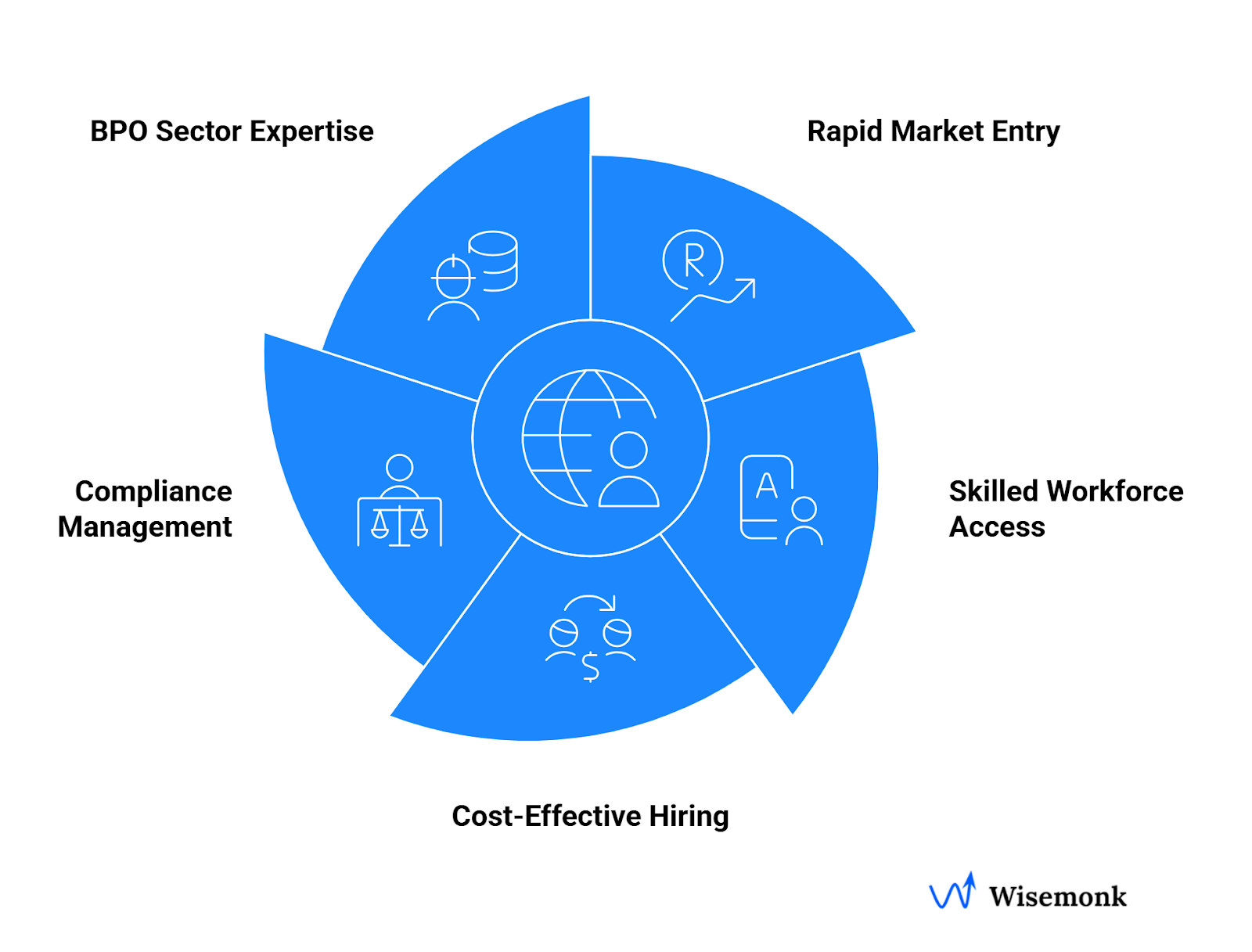
- Rapid market entry (no SEC registration required):
With EOR, you can hire employees right away, no waiting months for legal entity or SEC registration. This instantly opens doors to the Philippines' employer market and lets you start operations quickly. - Access to an English-speaking, skilled local workforce:
EOR service providers connect you to the Philippines’ large pool of highly skilled, English-proficient talent, the backbone of its BPO sector and global hiring reputation. - Cost-effective hiring without complex setup:
You avoid high upfront costs, legal fees, and ongoing admin burdens of opening a local entity. EOR Philippines solutions offer straightforward pricing, pay only for the employees you hire, with no hidden local costs. - Full compliance with labor laws and payroll:
EOR experts handle labor law compliance, local benefits, payroll taxes, and HR functions. This keeps your workforce management legal, accurate, and stress-free. - BPO sector expertise & specialist talent pools:
The best EOR partners know the local BPO landscape inside out. They help you tap into specialized talent pools for IT, customer service, and back-office functions, all with ongoing HR support.
Based on our experience supporting global companies, EOR record services deliver reliable, flexible business process outsourcing, simplifying recruitment, managing payroll, and protecting you from compliance risks in the Philippines.
How does the Employer of Record (EOR) process work in the Philippines?[toc=How EOR Works]
Here’s a clear, minimal breakdown based on our experience guiding global clients through EOR services :
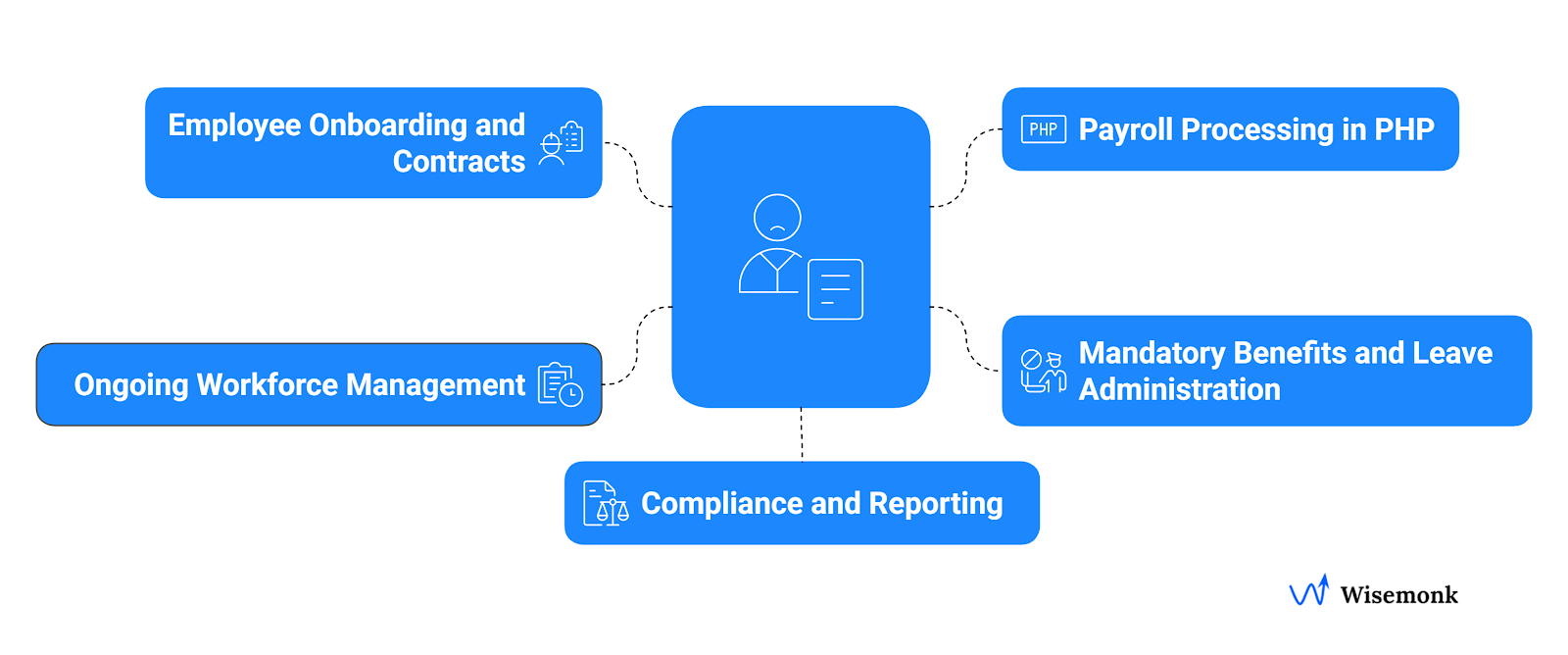
1. Employee onboarding and contracts:
The EOR takes care of compliant employment contracts, collecting new hire details, and registering them with government agencies (SSS, PhilHealth, Pag-IBIG Fund). This guarantees every employee gets the right statutory benefits and contributes to their social security, health insurance, and home development mutual funds.
2. Payroll processing in PHP:
EORs handle monthly payroll management, ensuring employees are paid in Philippine Peso, with payroll taxes, income tax, and government contributions withheld at source. Pay slips show gross pay, statutory deductions, and net salary, meeting strict local regulations.
3. Mandatory benefits and leave administration:
Compliance with 13th month pay, service incentive leave, and regional minimum wage is standard. EORs also manage holiday pay, overtime compensation, and other employee benefits like health insurance, ensuring all employment benefits are delivered accurately.
4. Ongoing workforce management:
The EOR covers contract management, performance administration, and handles local regulations on probation periods and terminations. This approach reduces compliance risks for global companies, simplifies benefits administration, and keeps you up to date on legal changes.
5. Compliance and reporting:
All HR functions, including payroll reporting, BIR filings, and retention of records, are done for you. This minimizes legal risks and makes sure you meet every local employment law, vital for smooth operations whether you hire a few staff or run a full-scale BPO.
In our experience, using an employer of record in the Philippines ensures a straightforward business process outsourcing journey. You get all the benefits of a local workforce, competitive benefits packages, compliant employment contracts, seamless paying salaries, without needing a legal entity or managing complex Philippine labor code compliance yourself.
What are the Philippines-specific Employer of Record (EOR) considerations?[toc=Considerations]
When using an EOR in the Philippines, understanding local rules is key to smooth operations and compliance.
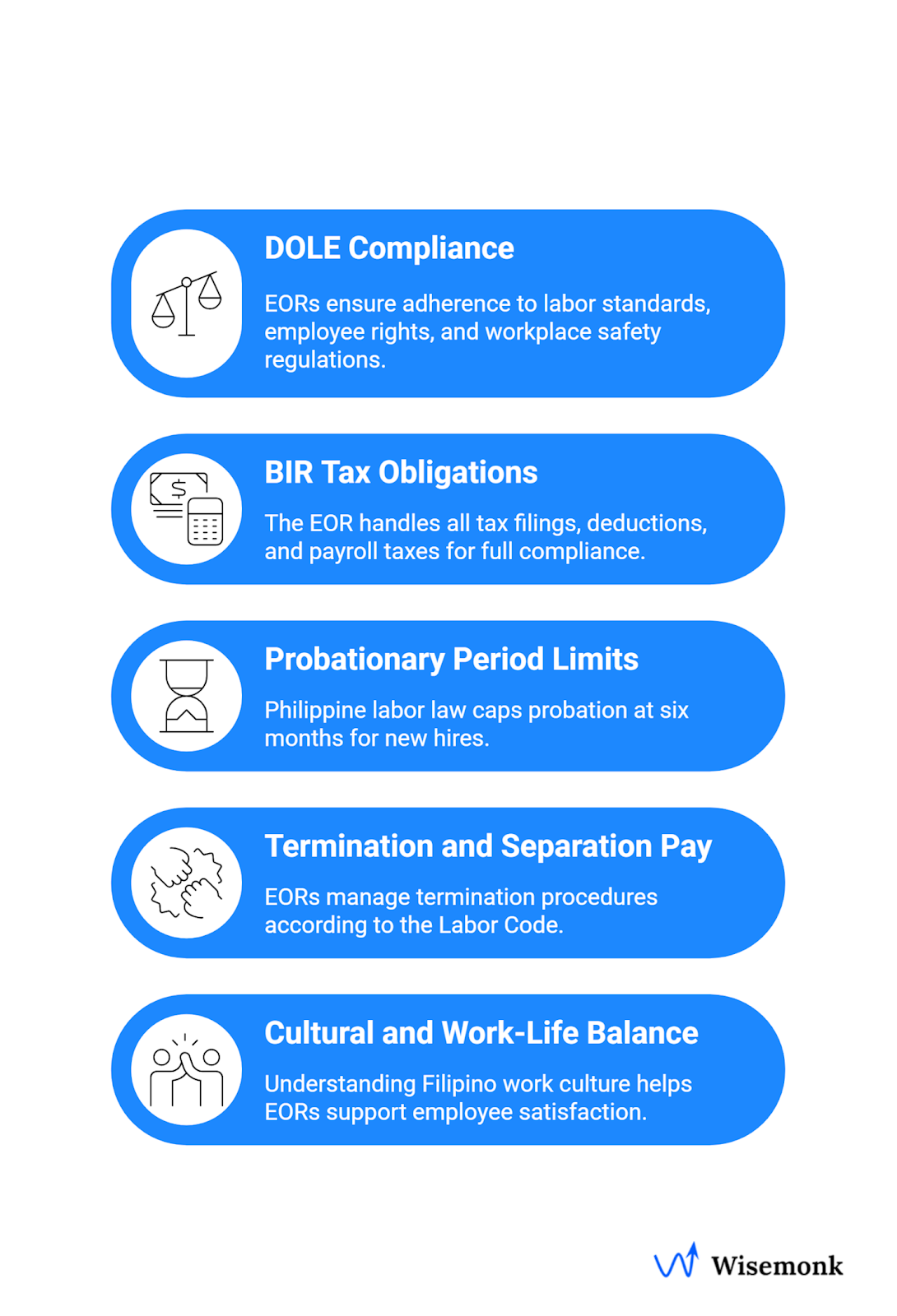
- DOLE compliance: EORs ensure full adherence to the Department of Labor and Employment (DOLE) regulations, including labor standards, employee rights, and workplace safety.
- BIR tax obligations: The EOR handles all Bureau of Internal Revenue (BIR) tax filings, income tax deductions, and payroll taxes to maintain full tax compliance.
- Probationary period limits: Philippine labor law caps probation at a maximum of six months for new hires, during which termination is simpler but still regulated under local employment laws.
- Termination and separation pay: EORs manage termination procedures according to the Philippine Labor Code, ensuring rightful separation pay and compliance with legal requirements for notice and due process.
- Cultural and work-life balance: Understanding Filipino work culture, including respect for family time and holidays, helps EORs provide workforce management that supports employee satisfaction and productivity.
In our experience, EOR providers with local expertise reduce compliance risks and deliver reliable HR functions while respecting local customs and regulations.
How do you choose the right Employer of Record (EOR) provider in the Philippines?[toc=How to Choose the Right EOR]
Picking the right EOR provider means finding a partner with strong local expertise and reliable technology to handle your workforce needs smoothly.
- Local expertise in Philippine labor law: An ideal EOR understands the Philippine Labor Code thoroughly, ensuring all employment contracts, benefits administration, and compliance risks are expertly managed.
- Technology platform for PHP payroll: Look for providers offering robust payroll processing systems that handle salaries in Philippine Peso (PHP) accurately while managing statutory deductions like SSS, PhilHealth, and Pag-IBIG.
- Multi-currency payment support: If you have a global team, your EOR should support multi-currency payroll and seamless payment processing to simplify financial operations.
- Trusted by BPO and tech companies: Client testimonials from business process outsourcing and tech sectors highlight provider reliability in managing complex HR functions and competitive benefits packages.
- Immigration help for foreign workers: Quality EORs assist with work visas and permits, helping global companies onboard foreign employees without legal hurdles.
Based on our experience working with global businesses, these factors ensure compliance, cost savings, and smooth workforce management in the Philippines market.
What is the cost difference between Employer of Record (EOR) services and entity setup in the Philippines?[toc=EOR Vs Entity Setup]
Choosing between EOR service and setting up a local legal entity depends largely on cost and administration.
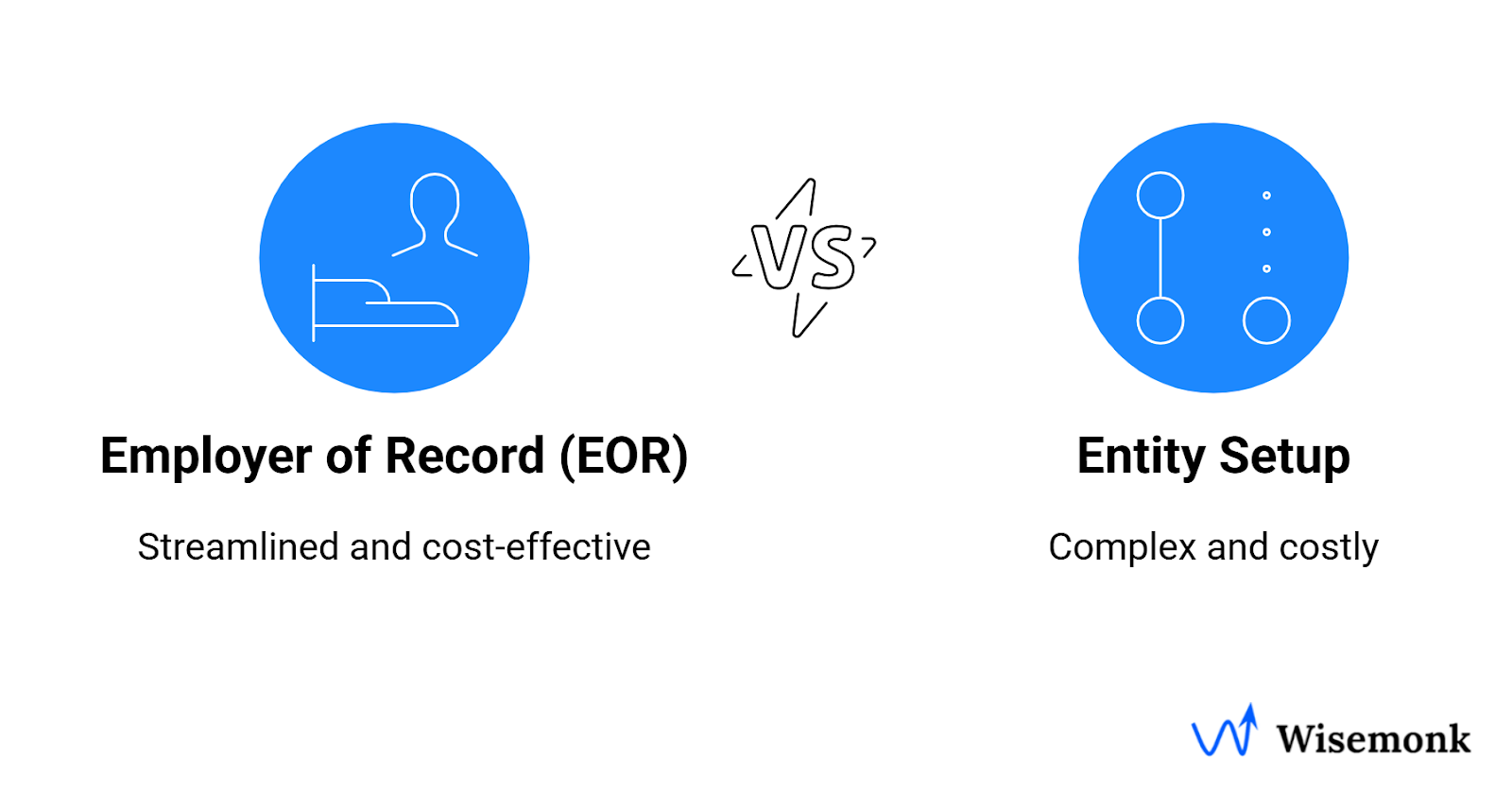
- EOR pricing: EOR fees typically range from $199 to $599 per employee per month, covering payroll management, statutory benefits like SSS, PhilHealth, Pag-IBIG, tax compliance, and HR functions. This pay-as-you-go model removes upfront costs.
- Entity setup expenses: Setting up a legal entity requires SEC registration, licensing, legal fees, and capital investment. These initial costs can reach thousands of dollars, often taking months and involving complex paperwork.
- Ongoing compliance and admin: Entity owners face continuous expenses for payroll taxes, mandatory benefits, local labor law compliance, and administrative tasks. These add to operational costs and increase legal risks.
- Hidden government fees and benefits: Both options must account for mandatory benefits and contributions, plus occasional increases in government fees and taxes that the employer pays.
- ROI and scalability: EOR offers faster ROI with minimal financial risk, ideal for startups or small teams. Entity setup suits larger or long-term operations but requires significant initial and ongoing investment.
In our experience helping global companies, EOR services provide a leaner, compliance-safe, and cost-effective solution for workforce management without the burdens of a local entity.
What is the future of Employer of Record (EOR) services in the Philippines?[toc=Future of EOR]
The Philippines’ EOR landscape is evolving fast with global shifts and local reforms shaping its growth.
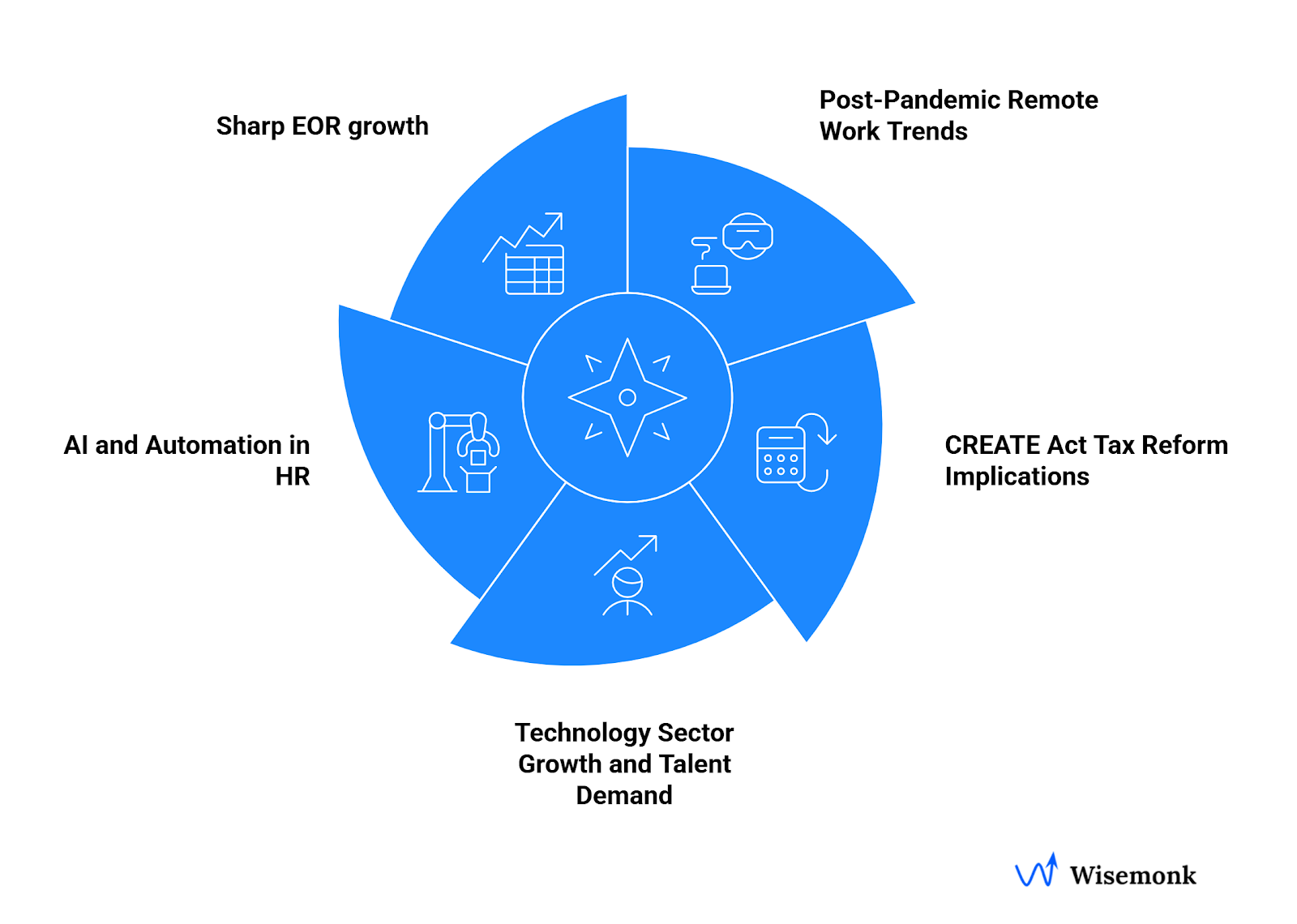
- Post-pandemic remote work trends: Remote employees and hybrid teams are becoming standard. EORs help global companies manage dispersed Filipino employees seamlessly, ensuring compliance with local labor laws and payroll management.
- CREATE Act tax reform implications: The CREATE Act introduced corporate tax cuts and incentives, impacting payroll taxes and income tax structures. EOR providers adapt to these changes, optimizing tax regulations and compliance risks for client companies.
- Technology sector growth and talent demand: As the tech and BPO sectors expand, demand for skilled Filipino employees rises. EORs offer access to specialized talent pools, simplifying hiring and benefits administration in a competitive market.
- AI and automation in HR: Automation streamlines payroll processing, benefits administration, and contract management. Many EOR service providers are integrating AI tools for faster, more accurate workforce management.
- Market predictions for 2025-2026: Based on industry reports and regulatory trends, EOR adoption in the Philippines is expected to grow sharply, driven by global hiring needs and business process outsourcing demand.
Combining local expertise with advanced tech solutions, EOR services will remain crucial for foreign companies aiming to hire Filipino employees compliantly, cost-effectively, and flexibly.
Conclusion[toc=Conclusion]
Philippines EOR adoption offers instant legal compliance, rapid market entry, cost savings, and seamless payroll management. International companies benefit from expert local labor law guidance, competitive benefits, and stress-free workforce management for both Filipino and remote employees.
For decision-making, assess your business needs, expected team size, and desire for overhead reduction. EOR suits companies seeking flexibility and minimal legal risks. The implementation timeline is fast: onboarding can start within days, with fully compliant employment contracts and payroll processing ready by the first payroll cycle.
Based on our hands-on experience, EOR services provide the fastest, safest way to hire employees in the Philippines, freeing you from complex local regulations and administrative tasks.
Ready to expand your global workforce quickly and compliantly? Partner with Wisemonk’s Employer of Record services to effortlessly manage hiring, payroll, and compliance, so you can focus on growing your business with confidence.
Frequently asked questions
What are the mandatory benefits for employees in the Philippines through EOR?
Mandatory benefits include 13th-month pay (1/12th of annual basic salary, paid by December), Social Security System (SSS), PhilHealth health insurance, Pag-IBIG Fund contributions, and Service Incentive Leave (minimum 5 paid days per year after 1 year of service). EOR providers also ensure payroll taxes and other statutory benefits are fully administered per Philippine labor laws.
How long does it take to hire an employee in the Philippines using EOR?
With EOR, the hiring process can be completed in just a few days. Most EOR providers can onboard employees within 5–10 business days, covering contract signing, government registration, and payroll setup, depending on document availability and background checks.
Can EOR providers help with work visas for foreign employees in the Philippines?
Yes, reputable EOR service providers assist with work visa applications for foreign employees. They manage immigration support, documentation, and Bureau of Immigration requirements, ensuring legal entry and compliant onboarding for expatriate staff.
What happens to 13th-month pay if an employee leaves mid-year?
If an employee leaves before the end of the year, they are entitled to a prorated 13th-month pay based on their months of service during that calendar year. The EOR calculates and processes any unpaid portion during final pay in accordance with labor regulations.
How does EOR handle regional minimum wage differences across the Philippines?
EOR providers track regional tripartite wage board announcements and apply the correct minimum wage rates in each location. This ensures all employees receive at least the legal local minimum as mandated by their region, fully complying with wage regulations.
What is the difference between payroll and employer of record?
A payroll provider mainly handles salary processing, tax filings, and related software solutions. An Employer of Record (EOR) goes further by legally employing workers on your behalf, managing payroll, compliance, and broader HR responsibilities, especially for international teams.
What is Employer of Record in the Philippines?
An Employer of Record (EOR), lets companies hire and onboard employees in the Philippines quickly, often within two weeks, without the cost or risk of setting up a local entity.
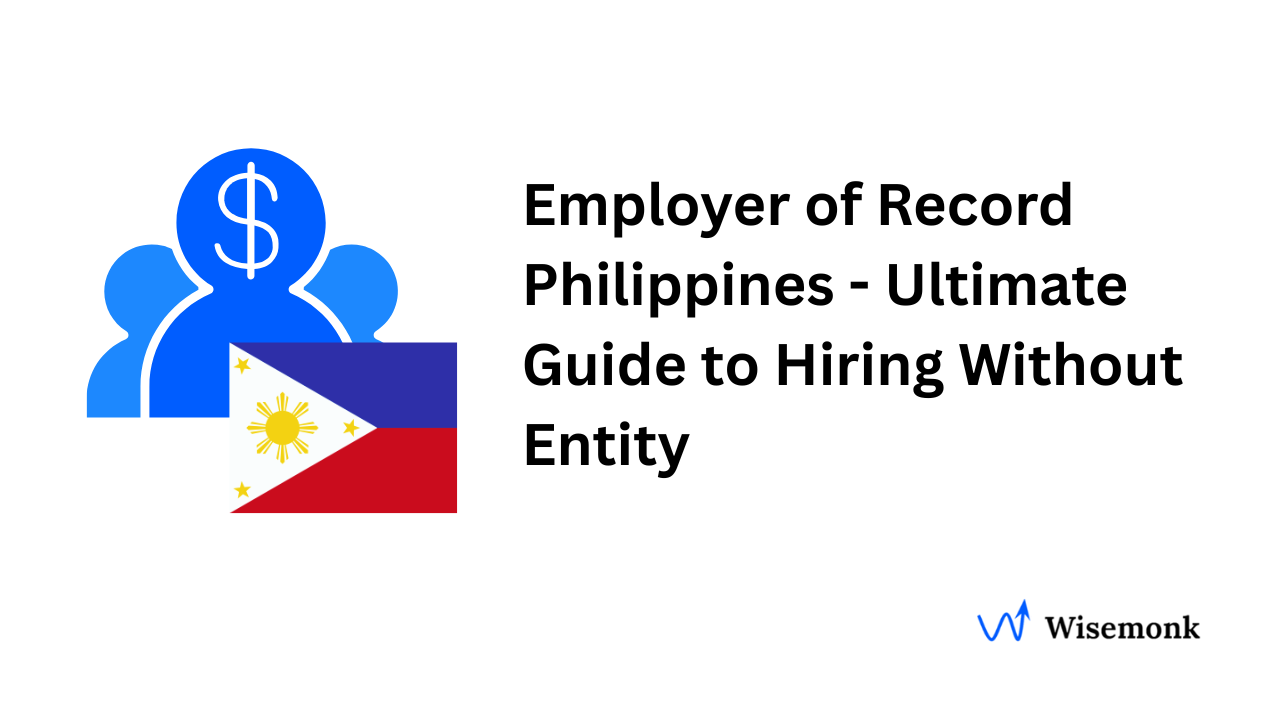

.png)
